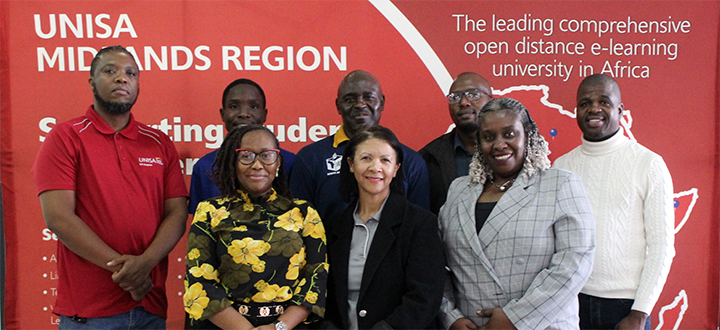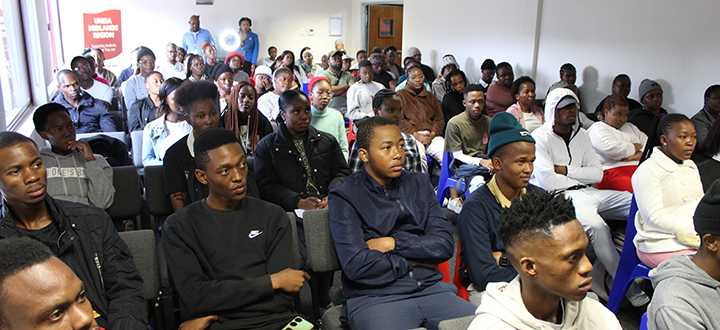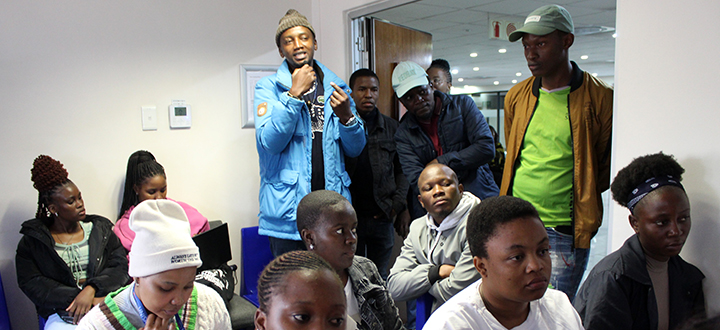News & Events
Midlands Region fosters dialogue on the multiparty state
The Unisa Midlands Region hosted its annual lekgotla on 23 April 2025 at the Rustenburg hub, focusing on the theme of the multiparty state. Held in collaboration with internal and external stakeholders, the aim of the lekgotla was to enrich society and to promote active citizen engagement in societal issues of concern.

Back, from left: Gabriel Mafoko (Desktop Support Technician, ICT), Petrus Sello Tshapo (Secretary: RSRC), Khehla Ntsimbi (IEC representative), Nelson Kesa (Human Rights Officer, SAHRC), and Yandani Chagi (Regional Academic Coordinator)
Front, from left: Tuduetso Setuki (Administrative Officer: Counselling), Letitia Lekay (Acting Deputy Director: Academic and Technology Support), and Keleabetswe Malema (Branch Librarian)
In her opening address, Angie Bopape, Acting Director of the Midlands Region, highlighted that the inaugural lekgotla was established in 2024 to create a platform for dialogue that will contribute positively to an understanding of what democracy means in society, and the rights and responsibilities it entails.
She continued: “It also allows us to engage not only with the academic community but also with the communities we serve. This shows that we are an integral part of society and can engage with them meaningfully. Therefore, it is important to understand the impact of the multiparty state on our daily lives. Power resides with the people; let us own our democracy and do something about it.”
Khehla Ntsimbi, representing the Independent Electoral Commission (IEC), spoke about the IEC's constitutional and legislative mandate within the multiparty framework. He underscored its role in managing and overseeing national, provincial and municipal elections, ensuring that all processes are carried out freely, fairly, transparently and without fear or favour.

Students attending the event
Advocate Sipho Mantula, a researcher at the Thabo Mbeki African School of Public and International Affairs, stated that engaging in dialogue on the multiparty state, the government of national unity and coalition issues involve reflecting on the historical context of governance and elections before and after 1994, adding that it is important to include democracy and the rule of law in conversations about governance.
He discussed the role of traditional leaders in the multiparty system within a democratic dispensation, noting the growing involvement of traditional leaders in politics in that they are increasingly joining political parties and, in some cases, included in their manifestos. He observed that the political governance of a multiparty state is all about accountability, transparency and electoral dispute resolution.
He continued: “There is a need to diagnose the challenges of the electoral system and the multiparty state and to derive a prognostic approach on how to find solutions to the problems. If a multiparty system is aligned with the African traditional political system, where everybody has a voice, it is Batho Pele, as the Constitution emphasises. The elected public representatives should be held accountable and do the right thing during election time.”
Mantula further expressed concerns about governance at the municipal level, particularly regarding the roles of ward committees, mayoral committees and ward councillors in a multiparty state where there is co-governing. He stressed that community interests must come first and highlighted electoral dispute resolution and community-engaged scholarship projects in rural areas such as Tlokwe, Moutse, Tzaneen, and Mabopane.
Nelson Kesa, Human Rights Officer from the South African Human Rights Commission (SAHRC), gave an outline of the role and mandate of the SAHRC, observing that it is an independent entity, subject only to the Constitution and the law, that must be neutral in exercising its power and perform its functions without fear, favour or prejudice. He noted that section 184(1) of the Constitution mandates the SAHRC to promote respect for human rights, a culture of human rights and the protection, development and attainment of human rights.

Students actively participating in the discussions
Kesa elaborated on the SAHRC's role in the multiparty state, which is to strengthen constitutional democracy by educating the public on human rights, the rule of law and the responsibilities of individuals in a democratic society. As part of this role, it fosters a human rights culture that transcends political ideologies. It operates independently from the government and political parties to ensure that no party or department can interfere with its mandate. In a multiparty state, political shifts may occur; therefore, the commission provides oversight to ensure human rights obligations are maintained. In addition, it supports legislative and policy development and facilitates inclusive public participation.
Petrus Sello Tshapo, Secretary of the Regional Student Representative Council (RSRC), drew parallels between national democracy and student governance. He asserted that the SRC should represent the diverse voices and interests of the student body, noting that the SRC plays a critical role in advocating for students’ academic, social and economic welfare. He stated that, on the strength of representation from various student organisations, the SRC becomes a platform for participatory leadership and a battleground for competing ideologies. This introduces a unique opportunity to examine how the structure and function of a multiparty state influence the operations, effectiveness and direction of the SRC in advancing student interests.
Tshapo outlined some advantages of a multiparty state, emphasising that it encourages debate, innovation and accountability and creates an environment in which ideas are openly discussed and refined rather than imposed. For students in higher education, he noted, this system offers a vital educational experience in democratic participation, negotiation, leadership, enhanced representation and accountability. He concluded by asserting that a well-functioning state can model effective democratic governance – not only within Unisa but also in the broader society – by promoting inclusivity, cooperation and a shared purpose that yields meaningful and lasting benefits.
Letitia Lekay, Acting Deputy Director: Academic and Technology Support, concluded the event by thanking the speakers and attendees for their active participation. She remarked that the session provided valuable insights into the concept of a multiparty state in various spheres and encouraged everyone to contribute to building an integrated society.
* By Thotogelo Masenya, Communication and Marketing Officer, Midlands Region
Publish date: 2025-05-06 00:00:00.0

